John O'Mahony spent 40 years waiting to see the man who shot him and murdered his colleagues brought to justice.
In December, a seven-judge military court in Lebanon found 76-year-old Mahmoud Bazzi guilty of the murders of Privates Thomas Barrett and Derek Smallhorne.
The verdict came five years after John stood in front of those judges to recount the events of 18 April 1980.
"That is the man who shot me," John told the court, pointing directly at Mr Bazzi.
Four months on from the verdict, John told Prime Time that it had been a long road.
"Forty, forty-one years is a long time. I feel that we got justice in the finish," John said, speaking from his home in Scartaglin in Co Kerry.
On the fateful day, John and Privates Barrett and Smallhorne were on United Nations peacekeeping duties when their convoy was stopped by an Israeli-backed militia known as the De Facto Force, or DFF.
The three army privates were separated from other nationalities of UN personnel who had been travelling in a three-vehicle convoy.
John was shot in the stomach and the leg. His two colleagues were abducted and shot dead.
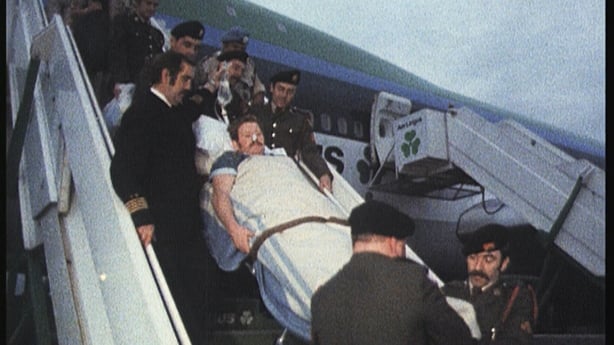
Bazzi was identified immediately as the suspect in the case.
Having had interactions with him on a number of occasions in the region, John recognised him, in part because of a distinctive patch of white hair on his head.
In November 2015, John travelled to Beirut to give evidence in the trial of Bazzi.
In 2000, some 15 years earlier, Prime Time reporter Fiona MacCarthy and producer Janet Traynor found Mr Bazzi working as an ice-cream vendor in Michigan.
To this day, it is not known how he got from southern Lebanon to the US.
At that time, and speaking through an Arabic translator, Bazzi denied being the person who had fired the fatal shots.
He continued to deny the crimes during his trial, which began in Beirut just months after he was deported from the US.
No one knew then that it would take another five years for a verdict to be reached.
When the verdict came last December, it was sudden and unexpected.
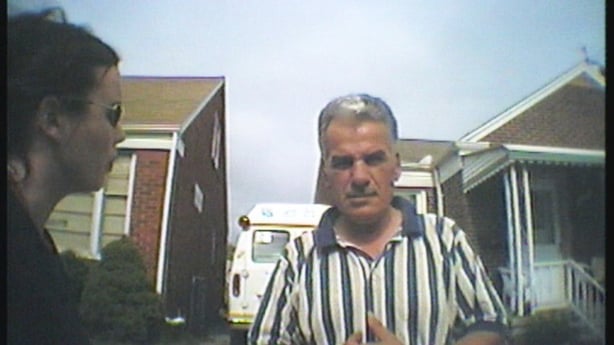
The written judgement found Bazzi guilty of the murders of Privates Smallhorne and Barrett.
Though he was given a life sentence, it was reduced to 15 years, perhaps because of his age.
Derek Smallhorne and Thomas Barrett were both married with three children.
Derek was from Dublin, Tom from Cork. For 40 years, their families have campaigned for justice.
When the verdict came last December the manner in which the news reached the Barrett family caused them upset.
"We were told Bazzi was given a 15-year sentence, but we weren’t told for what. Was it for the murders? For the attempted murder? We weren’t told," Tom Barrett’s daughter, Karen, told Prime Time.
It was not until a day later that it emerged that Bazzi had been convicted of all charges.
The Department of Defence told Prime Time that information was relayed to the families as soon as it was received by officials.
Karen Barrett said her family want to see the court transcript of the verdict – and what was specifically said in relation to her father’s case.
The Lebanese military justice system does not provide for victim impact statements in the manner that Irish law does.
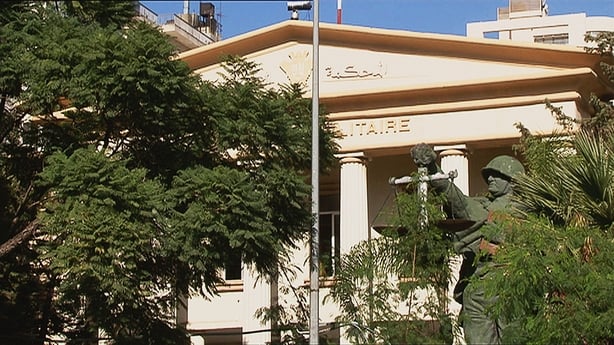
"I need that transcript between the judge and him, where he's told he's guilty. Until I see that in writing, I don't think I'll process it right," Karen said.
"I can remember that day in 1980 to this day," Emily told Prime Time in recent days, the raw emotion of the loss still very visible on her face.
"My children were three, four-and-a-half, and six. On Communion days and other days that were meant to be happy, they were out in the graveyard," she said.
The verdict in the trial was a written judgement – and in Arabic.
The Department of Defence told Prime Time that it had originally intended to give the families a translated version of the Lebanese court document.
The Department said that it later was told that the document should not be released while an appeal in the case was pending.
However, the Department said that, in light of the continued concerns of the Barrett family, it would review the matter again.
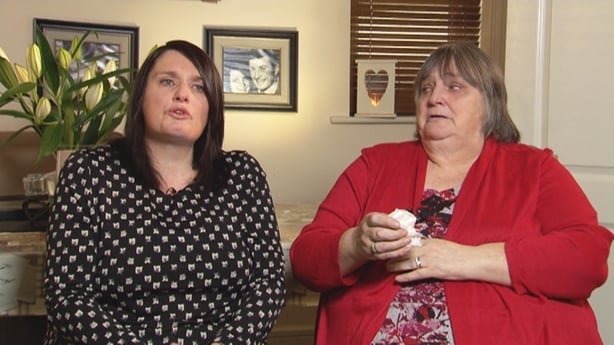
Derek Smallhorne’s three children – Derek Jnr, Kim and Lynn – said the verdict was a weight off their shoulders.
"Once the verdict came in I said 'thank God, it’s over'," Derek told Prime Time.
Now 50, Derek was nine years old when his father was murdered. He has vivid memories of the intense media attention – and now realises the extent to which his mother was impacted by her husband’s death.
"You grow up, you have your own family, and it’s then you realise what my mother had to do to make sure we were all okay," he said.
Recently, Martha and the rest of the Smallhorne family travelled to Palmerstown Cemetery and released balloons in memory of their family.
"I want to celebrate my Dad’s life," Kim said. "We didn’t really realise how important justice was until we got it."
"I feel like it is the end of an era and the start of a new one."
John O’Mahony and both families pay tribute to the former soldiers who launched the Justice for Smallhorne and Barrett campaign in 2014.
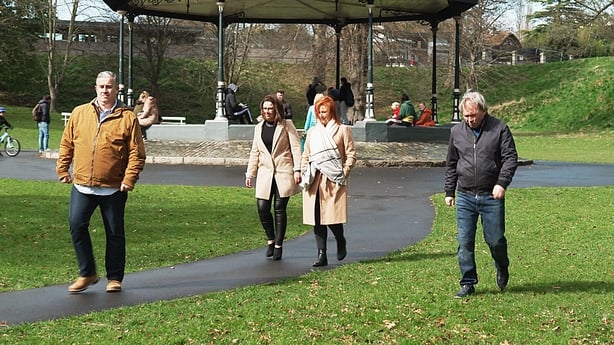
Their efforts helped bring about Bazzi’s deportation from the US, 14 years after Prime Time found him in Michigan.
"I joined the Defence Forces at 17 years of age and Derek Smallhorne was ten years older than me," said Andy O’Shaughnessy, one of the members of the group.
"He was an absolute character – one of those real Dubs, great character, great guy to go on duty with."
Robbie Masterson, another member of the group, was 19 years old and in the same battalion as Derek Smallhorne when he was murdered.
Standing at a memorial to the soldiers opposite Government Buildings at Dublin’s Merrion Square, Robbie said that his battalion returned to Ireland shortly after the murders, when its peacekeeping tour concluded.
But, he said, the tour only fully ended last December, when Mr Bazzi was found guilty of their colleagues' murders.
It was at Merrion Square in April 2014 that their campaign really took off. Hundreds of former soldiers gathered and marched in a dignified silent vigil to the US Embassy in Ballsbridge.
Less than a year later, Bazzi was deported from Detroit to Beirut.
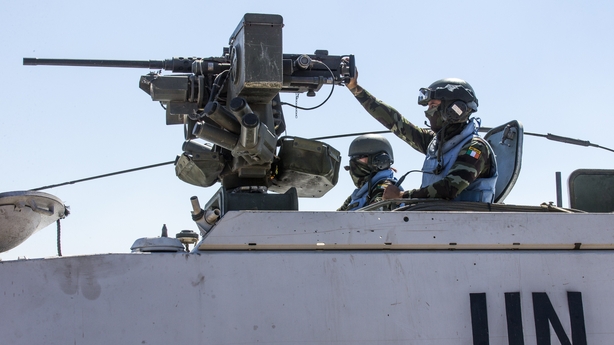
Some 47 members of the Irish Defence Forces died in Lebanon.
Paul Clarke, another member of the campaign group, said that the dedication and sacrifice of the country’s soldiers on peacekeeping missions helped Ireland earn its seat on the United Nations Security Council.
"We will never forget the guys we lost overseas, never," he told Prime Time.
More than 40 years after Privates Smallhorne and Barrett were abducted and murdered, shot at point-blank range, their loved ones now have some measure of justice.
While Bazzi is appealing the verdicts in the case, he remains in custody.
Even now, John O’Mahony told Prime Time that many questions remain.
"How did Bazzi get to America? Who took him in and protected him in America? Why did the Irish Government never get any answers? I can’t see the day we will get answers," he said.
But John said that they must all get on with what is left of their lives.
"At least Bazzi is locked up in Lebanon," he said. "That is the bottom line to me."
Watch reporter Barry Cummins and producer Angela Ryan's report on Prime Time, tonight at 9.35pm on RTÉ One. A special extended programme about the murder will be shown on RTÉ One at 10.15pm on Tuesday 20 April.






